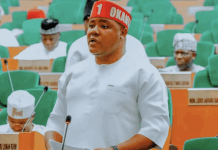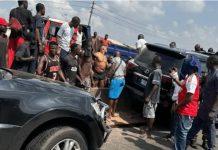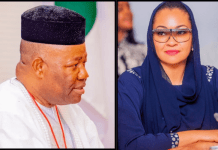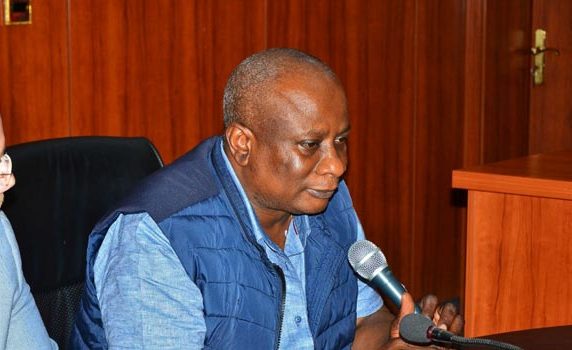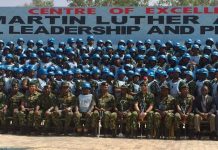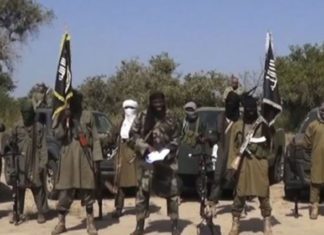Last week, Nigeria ‘s who-is-who in the realm of humanitarian affairs converged in Maiduguri, Borno state, for a 3-day “International Workshop on Improving Civil – Security Cooperation” where participants brainstormed on how to foster a better working relationship among all stakeholders.
The event was convened by the minister of the newly created Ministry of Humanitarian Affairs, Disaster Management and Social Development, Saadatu Umar-Faruq, and hosted by Borno state governor, Professor Babagana Zulum.
The President of Nigeria, Muhammadu Buhari was represented by his Defence Minister Bashir Magashi, a retired Major General.
Of course, such an event is expected to be colored with speeches from the galaxy of the stakeholders in attendance. The summit which also comes as a kind of training workshop for participants also had journalists and civil society representatives in attendance.
Though the minister, as well as the rep of the president and the host governor, who led other representatives of other state governors, had delivered speeches hammering on the need for robust coordination amongst humanitarian actors, the keynote speech delivered by UN Humanitarian Coordinator in Nigeria, Edward Kallon stood out amongst others. Not necessary because Mr. Kallon has a towering height or because he represents the world’s most powerful nongovernmental, but his speech stood out because he spoke the cold hard fact about the situation in the Northeast states.
Mr. Kallon felt these are “not the time for fiction.”
His overtness about the situation in Borno state particular sent chill down the line of all those who had listened to him.
His revelations about the current state of affairs as pertains to the counterinsurgency efforts of the Nigerian government are quite mind-boggling.
Mr Kallon’s presentation continues below:
Working in a counter-terrorism environment.
“Most of us here are familiar with working in slow-onset emergencies, natural disasters, and complex emergencies. However, working in a counter-terrorism environment with a functioning Government like Nigeria requires: (i) constructive engagement, transparency and information sharing; (ii) adapting strategies and global best practices to the counter-terrorism environment; (iii) needs-based, principled humanitarian action that hold each other accountable; (iv) due recognition of the sovereignty of the Government; and (v) joint risk analysis and mitigation.
“We must pursue a coordinated joint security analysis and establish systematic information sharing with consequences for non-adherence to civil-military coordination. The humanitarian policy of stay and deliver in northeast Nigeria remain challenged and requires enhanced risk mitigation, maintaining access, coordination, enhancing advocacy and more flexible funding.
State-level leadership and ownership critical
“Logistics constraints to deliver humanitarian cargo must be overcome to ensure an effective response.
“We are here today because we share common goals of saving lives and protecting people.
“We want to recognize the role of the military and security forces in the fight against terrorism and insecurity in the country. We should always remember that in 2015 and 2016 when the Nigeria armed forces liberated most areas of Borno State including Bama, Monguno, and Rann. They were the first providers of basic humanitarian services. They carried out polio vaccination and were amongst the first to fight against severe acute malnutrition. In Bama, for example, every single day, dozens of mothers and children would cross the road separating the IDP camp from the military-run clinic where they knew they could find the support they urgently needed.
“The crisis, which once affected six states, is now contained to the three states of Borno, Adamawa, and Yobe. The international community joined all Nigerian partners to rapidly scale-up the humanitarian response in accessible LGA and provided humanitarian assistance to 5.6 million people in 2017; 5.5 million people in 2018 and over 4 million in 2019 as of October. The Nigerian Armed Forces in the northeast have been a critical component in ensuring a safe and secure environment to enable humanitarian and development partners to carry out their work.
“A continuation of the military effort to deal with hardcore insurgents remains critical. However, this must be complemented with a political process /peacebuilding to find a durable solution to this crisis. Investments in addressing the root causes of the crisis including prolonged development deficit, human rights and Governance deficit, multi-dimensional poverty, and climate vulnerabilities are also essential. There are no humanitarian solutions to humanitarian problems. We must prioritize prevention always, development wherever possible and humanitarian action when necessary.
” The crisis, which once affected six states, is now contained to the three states of Borno, Adamawa, and Yobe…. “
“Today and over the next three days, while we will be looking at processes, procedures, and frameworks, please keep in mind that these are designed to support our common goals, and think about the impact they have on every single person receiving aid through these old or new systems we will be discussing here.
“Our priorities should remain to see how we can collectively bring back normalcy in their lives, improve their well-being, living standards, and coping mechanisms. The collectiveness and complementarity of the work we do will be key to saving many more lives, building the resilience of others and fostering recovery, stabilization, reconstruction, and development in a safer environment.”
Improving Civil-Security “Cooperation and rebuilding trust is our priority at a time when Nigeria is facing multi-faceted and multi-dimensional humanitarian and development challenges in various parts of the country.
“Having reached its 10th year, the protracted crisis in the north-eastern states of Borno, Adamawa, and Yobe remains the largest humanitarian crisis, with over 7 million people still in need of humanitarian assistance. This crisis deserves our sustained attention and renewed commitment.
“Over the past ten years, over 35,000 people have lost their lives in this crisis. About 14,000 were civilians, but many others were members of the Armed Forces of Nigeria.
“The crisis has also had a heavy toll on aid workers and the past year has marked a turning point in our response. Aid workers, whether they are working for the United Nations, international or national NGOs or ministries, departments, and agencies, have increasingly become the target of attacks by non-state armed groups, criminals and petty thieves. Ten aid workers, all Nigerians, have died as a result of violence perpetrated by Boko Haram and other non-state armed groups in the past 18 months. Six of our colleagues are still held, hostage.
“Though we are still saving the lives of many every single day, we are also working within a continuously shrinking humanitarian space, and have reduced access to vulnerable people due to insecurity and a complex operational environment. As of this year, two more LGAs have become out-of-reach for the humanitarian community. While we strive to improve the quality of services to people we reach, there are now an estimated 1.2 million people who cannot be reached by the humanitarian community and represent an estimated 50 percent increase in geographic space and a 30 percent increase in numbers of people in comparison to last year.
“Preserving humanitarian access to the affected population within the current context of the BAY states will continue to be the most critical and challenging element to ensuring a response commensurate to the needs in 2020 and beyond.
“Armed conflicts may not be preventable, but there are rules that apply, and they have limits. Adherence and observation of laws of armed conflict is a must. Pain and losses cannot be avoided but they can be reduced.
“Nigeria, as a sovereign state, is faced with the continued fragmentation of different factions of NSAGs, the increase in criminal activities and use of asymmetrical warfare, as well as complex conflict dynamics.
“More than ever, it will be essential to understand these challenges and work with all partners. It is crucial for all of us to do our utmost to foster a principled, effective and efficient response to people’s suffering and to strife for unfettered and safe humanitarian access to people in need.
 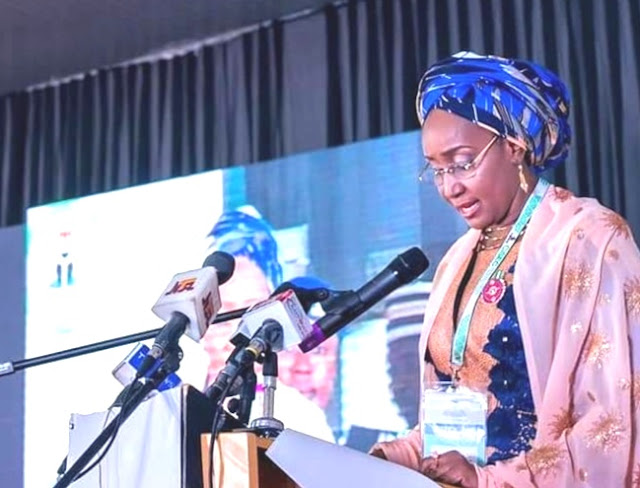 |
| Minister of Humanitarian Affairs and Social Development, Saadatu Umar-Farouq , convened the Workshop as part of efforts to engender a harmonised the humanitarian service in the Northeast ———————– |
“Despite challenges, in 2019, the humanitarian community has so far provided critical and life-saving assistance to more than 4 million people in Borno, Adamawa and Yobe states, most of whom are women and children. This humanitarian assistance ranges from food, protection, water, shelter, and sanitation, to medicine, education and agricultural support, and is being delivered to vulnerable women, children and men across the three states.
“Together with the Government, we have built a transparent humanitarian response.
“Together we have established civil-military coordination mechanisms where we regularly share information, promote common situational awareness, discuss operational issues and troubleshoot them to the best of our abilities, but also exchange information on security incidents and their consequences on the civilian populations in Borno, Yobe and Adamawa states. These coordination mechanisms have been established at various levels: national, State and LGA levels.
“Over 700 people, half of them from the Armed Forces, have developed critical skills and capacities to work in complex humanitarian situations. They were trained by our OCHA colleagues as well as other partners to explore new ways of fostering people’s rights and ensure their protection in some of the most difficult asymmetric conflict situations in the world today.
“It is only by a better understanding of each other’s work, our common rules, the rights we aspire to foster for all Nigerians and the protection they deserve, that we will be able to continue making progress in our collective effort to bring back normalcy in the three most affected states.
“The establishment of the Ministry of Humanitarian Affairs, Disaster Management and Social Development is a clear demonstration that the Government of Nigeria is committed to enhancing coordination and creating a conducive environment for humanitarian assistance, guided by our common principles.
 |
| (From left) Minister of Humanitarian Affairs, Umar Farouq, Defence Minister, Magashi, Borno Governor, Professor Babagana Zulum —————————- |
“I welcome the initiative and leadership of the Ministry in organizing this workshop in Maiduguri and enabling us to look at specific aspects of our collective work in some of the most challenging contexts.
“I am confident that the work we are about to embark on over the next three days will generate further integrated frameworks between the international community and national partners, in symbiosis with other mechanisms facilitating greater participation of local authorities, local communities and affected people.
“The seven-point agenda presented by the Humanitarian Coordinator last week presents an opportunity. This framework, which builds on our collective, existing agreed mechanisms, is needed to address the recurrent concerns of the Government, Military and Humanitarian actors in northeast Nigeria with the overall objective to work towards building a stronger partnership through constructive engagement at all levels.
“I am confident that discussions will build on the ‘North-East Nigeria-Specific Guidance on the Interaction and Coordination between the Humanitarian Country Team and the Nigerian Armed Forces or the Multinational Joint Task Force’ that was developed by many in this room a while ago.
“I am confident that all of us will try to better understand the modalities through which we have chosen to operate after a thorough analysis of the topography and terrain – from both the military and the humanitarian perspectives. An analysis of our strengths, weakness, opportunities, and threat will be useful.
“Our role is to make sure nobody in the north-east remains dependent on humanitarian assistance to survive and that we can help local communities help themselves and their neighbors.
“This is the first time that we, as civil authorities, as military, as humanitarian actors, national and international at all levels, are present together in one room. We must seize the opportunity offered this week to build the path for renewed and increased exchanges between all actors, under the leadership of the Government of Nigeria. There could be no better time than now, with one of our own, a true humanitarian, appointed as the first Minister of Humanitarian Affairs, Disaster Management, and Social Development.
“In conclusion, as your Humanitarian Coordinator, I count on you for your continued support to the people of Borno, Yobe and Adamawa states. Let us work together to save lives and contribute to restoring peace and stability to the region in the coming years with the joint goal of ending the crisis once and for all.”
Get every Post-UTM, Admission, List, JAMB, WAEC, NECO, and Schools Resumption Date, Breaking News on your WhatsApp Status Now - To join, click the links below.
Join Television Nigerian Whatsapp Now
Join Television Nigerian Facebook Now
Join Television Nigerian Twitter Now
Join Television Nigerian YouTUbe Now
Join Television Nigerian Whatsapp Now
Join Television Nigerian Facebook Now
Join Television Nigerian Twitter Now
Join Television Nigerian YouTUbe Now

